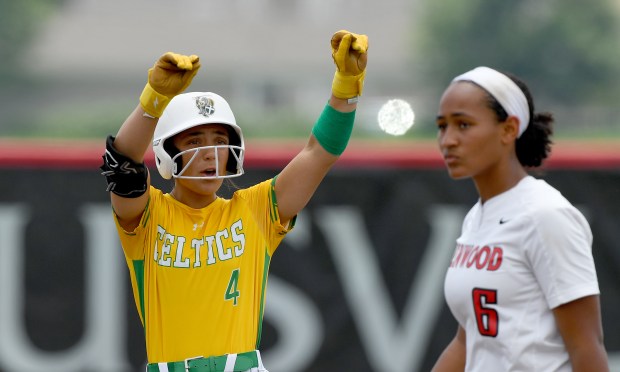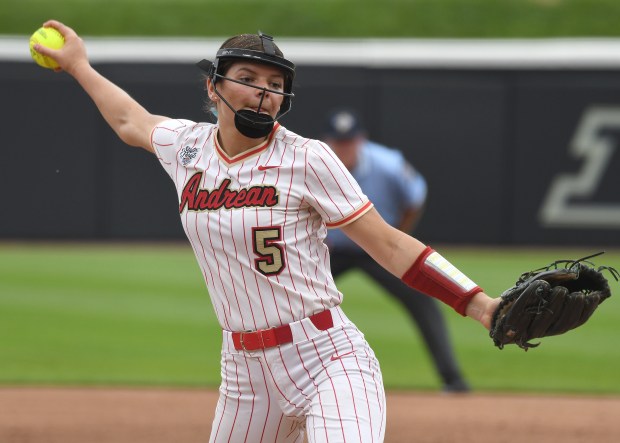Among the more than 2,000 “No Kings” protests planned nationwide Saturday, organizers anticipate that the one in downtown Chicago will be one of the largest, with tens of thousands expected to march from Daley Plaza and coalesce in defiance and admonition of President Donald Trump near the downtown hotel tower bearing his name.
The Chicago protest, part of what organizers describe as “a national mobilization to reject authoritarianism,” is scheduled to begin at noon at Daley Plaza with several speeches, including one from U.S. Rep. Jesús “Chuy” García, a Democrat from the Little Village Neighborhood. Mayor Brandon Johnson is also expected to attend.
There are also several other No Kings protests scheduled around Chicago, including ones in Evanston, Geneva, Naperville, Highland Park and Arlington Heights, among other suburbs. The protests, according to organizers, are in “direct response to President Trump’s self-aggrandizing $100 million military parade and birthday celebration, an event funded by taxpayers while millions are told there’s no money for Social Security, SNAP, Medicaid, or public schools.
“Across all 50 states, communities will gather to declare: The president is not a king.”
The downtown protest comes after a week of tension in Chicago, where city streets have filled in recent days in response to the Trump administration’s actions in Los Angeles. There, Immigration and Custom Enforcement raids and the administration’s deployment of Marines and the California National Guard have led to fiery confrontations among demonstrators, ICE agents and police.
Earlier this week, in anticipation of a similar scene in Chicago, Johnson urged the city’s residents to “resist.” He described it as “a necessary fight for all of us to be able to push back” against ICE raids and the specter of the mobilization of troops in the city.
Johnson and others have expressed concern that Chicago, which has been an epicenter of ICE raids throughout the first five months of Trump’s second term, could become even more of a target in the administration’s continued crackdown on illegal immigration. The No Kings protest Saturday will begin with that simmering tension as a backdrop.
“We could all just sit at home and scroll on our phones and be really worried about what’s happening with our country, or we can go out and be in the streets and, very visibly, say we are not OK with what is going on with this administration,” said Sally Schulze, a spokesperson for Indivisible Chicago, which is organizing the downtown protest.
“We have seen what is going on in California right now, to send the military to the streets of a city in our United States of America — especially when that state has said, ‘Please don’t come here.’ That’s not OK, to see that they’re working on bills that are going to take Medicaid away, food stamps away; so many things from just average working people, and focus on giving more money to their billionaire friends.
“So this is an opportunity for us to be in the streets, and show that we are not going to be silent.”
Chicago’s No Kings protest is scheduled to end at 2 p.m., and organizers have a “shared commitment to nonviolent protest,” according to a statement. In the city and throughout Illinois, there has been no indication that the Trump administration is planning to deploy the military in reaction to demonstrations against the administration’s policy.
Even so, Illinoisans may notice more soldiers, military trucks and Humvees on the roads than usual this weekend, but that activity is part of a previously planned training schedule, and not any current events, Illinois National Guard spokesperson Lt. Col. Brad Leighton said Friday.
“It has nothing at all to do with the ICE or any of the protests or anything along those lines,” Leighton said.
Trump’s decision in recent days to deploy the California National Guard over the objections of Gov. Gavin Newsom has drawn legal questions and outrage from Democrats nationwide. The Illinois National Guard has not been activated by either the president or Gov. JB Pritzker, Leighton reiterated Friday, adding there’s no expectation they’d be activated Saturday.
Illinois Attorney General Kwame Raoul on Friday issued an advisory reminding protesters of their right to free speech, “even and especially if those views are critical of government policies,” while also asking them to speak out peacefully. State law prohibits local law enforcement officers from assisting federal agents with civil immigration enforcement operations in response to a protest, the advisory noted.
Raoul also issued guidance as a “refresher” to local law enforcement on the provisions of that state law, known as the TRUST Act.
“This moment demands that we all use our voices in protest, but it is up to protesters and local law enforcement officers together to maintain public safety at such demonstrations,” he said in a statement.
Chicago Tribune’s Olivia Olander contributed.




